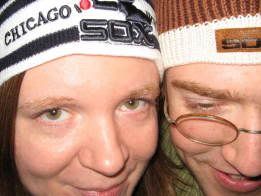 Word has arrived from my professor.....I passed my second exam with "flying colors!" She hasn't sent a review to the other profs on my committee, but will be doing so soon - so I hope it has a little more feedback on it. I am actually pretty sad to be moving away from the material I have been working with. Finally having a grip on Foucault, and reading boatloads of Susan Bordo (who is my new HERO) has really had a significant impact on my life. I thought the preparation and exam would be like pulling nails......but, I really enjoyed all of it.
Word has arrived from my professor.....I passed my second exam with "flying colors!" She hasn't sent a review to the other profs on my committee, but will be doing so soon - so I hope it has a little more feedback on it. I am actually pretty sad to be moving away from the material I have been working with. Finally having a grip on Foucault, and reading boatloads of Susan Bordo (who is my new HERO) has really had a significant impact on my life. I thought the preparation and exam would be like pulling nails......but, I really enjoyed all of it. I am moving onto Cuban History on Monday - which is what my major was. I am pretty burned out at this point, but I hope getting back into Cuba will be a joy rather than a stress. I start Loyola in like 6 weeks - so I have to get as much of this stuff under my belt as possible before that starts. It's a pretty huge reading list.
Anyhow, here is the question for my 2nd exam.....good, good stuff......
--
I want you to connect Foucault’s notions of how we “know” historical events (his ideas of the “Archaeology of Knowledge”) with the development of feminist theory. Why would his basic questioning of the connection of the development between power and knowledge have led Judith Butler to focus on uncovering the importance of examining the previously unexamined categories (pre-discursive categories) of male and female? Here, I’m thinking of dominant and subaltern, male and female.
What was it in Foucault’s ideas that opened the door to feminist theorists to use his ideas of the ways in which the entrenched power of modernity structured power relations that also allowed feminist theorists to re-imagine another avenue for uncovering the gender biases inherent in patriarchy?
How does Susan Bordo take it a step further to focus on the female as body to “flesh out” (Foucault’s ideas of the “docile body”) the impact of gender designation in (post)modern Western culture? Even thought Foucault does not directly address females, how do his ideas of the rationalization of norms and the establishment of deviancy impact females in today’s society? How does Bordo understand those constraints?





No comments:
Post a Comment